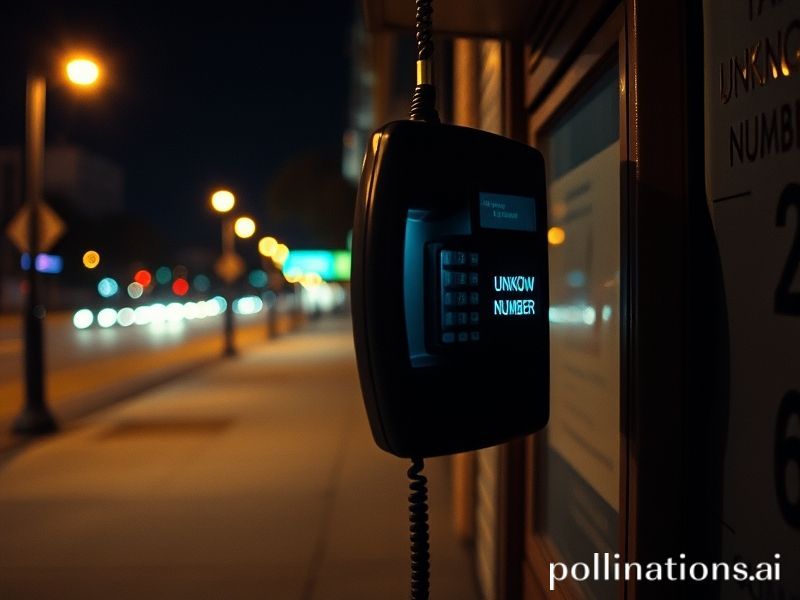unknown number film
Unknown Number: The Global Panic in Your Pocket
By Eduardo “Eddy” Valdez, Senior Paranoia Correspondent
PARIS—Somewhere between croissant number three and the daily existential dread of climate reports, I received a call from a number my phone labeled “Maybe: Death.” Naturally, I answered. The line clicked, a synthesized voice whispered “We know what you did,” and then—dial tone. I wasn’t alone. From Lagos to Lima, Berlin to Bangkok, the same phantom digits lit up screens at 3:47 p.m. local time, a neat trick considering time zones exist. Within minutes, #UnknownNumber was trending above the World Cup and below whatever Elon Musk had tweeted that hour. Humanity, ever the multitasker, found a way to be globally terrified in real-time.
The phenomenon has already been branded “the first truly planetary pocket horror film.” There is, as yet, no director, no studio logo, just a 37-second voicemail that sounds like HAL 9000 gargling bees. Telecom engineers swear the calls bypass satellites and submarine cables entirely, appearing directly on handsets like ideological WhatsApp forwards from the void. The ITU—the UN agency that usually spends its days politely alphabetizing spectrum disputes—called an emergency Zoom that crashed twice because half the delegates were busy screening their own incoming unknown calls. Irony, like latency, is a cruel mistress.
Credit where it’s due: whoever orchestrated this managed to unite a fractured world faster than any climate accord. In Washington, senators who can’t agree on lunch demanded an immediate classified briefing, then leaked the briefing before it happened. Meanwhile, the EU invoked GDPR’s “right not to be creeped out” clause—yes, it’s in there, page 847, subsection “existential unease”—and threatened Meta with a fine the size of Belgium. Across the East China Sea, TikTok’s Chinese twin Douyin gamified the scare: users lip-sync the voicemail in minor keys, rack up micro-tips, and brag about “surviving the call.” State censors applaud the nationalism; the algorithm quietly harvests vocal fingerprints. Everyone wins, especially the shareholders.
The global south, accustomed to being the collateral damage of richer nations’ innovations, greeted the stunt with a collective shrug. “Unknown number? Try unknown currency,” quipped a Nairobi Uber driver between potholes. In Delhi, scam-call veterans offered master classes on how to sell life insurance to the disembodied voice. Brazil’s favelas turned the ringtone into a funk carioca beat; within 48 hours it was blasting from jeitinho-modified scooters, proving once again that the periphery remixes apocalypse into danceable content faster than Silicon Valley can monetize it.
Security agencies, those eternal toddlers chasing laser pointers, have split into two camps. Camp A insists it’s an elaborate phishing campaign powered by generative AI. Camp B, citing the calls’ perfect simultaneity, suspects a physics experiment gone rogue—possibly related to CERN’s “let’s open another dimension before lunch” initiative. The Bulletin of the Atomic Scientists moved the Doomsday Clock forward by one second, a unit so meaningless it verges on performance art. Somewhere in Moscow, a GRU colonel is drafting a memo titled “How to Weaponize Existential Dread,” already translated into 14 languages and one emoji set.
Of course, markets reacted. Samsung and Apple stock dipped on rumors of a mandatory “exorcism patch,” then rebounded when influencers declared vintage Nokia bricks “spiritually immune.” Crypto bros launched $PHANTOM coin, promising a decentralized ledger of everyone who ever ignored the call; it rug-pulled itself within six hours, an impressive new record. Only the Swiss remained calm: their watches kept perfect time, and their banks discreetly opened “post-mortem escrow accounts” for clients expecting to be haunted into early inheritance.
What does it all mean? Perhaps nothing. Perhaps everything. In an era when reality TV hosts become presidents and presidents become reality TV, a mysterious voicemail is merely the next logical plot twist. The real horror isn’t the unknown number; it’s that we answered. We always answer. Because buried beneath the jokes, the memes, and the diplomatic démarches lies a universal human truth: we are unspeakably lonely, and even a computerized death threat feels like company.
So keep your ringer on, darling. Somewhere out there, the planet is calling—collect, naturally—and the charges, as always, are to your soul. Pick up or don’t; the void will leave a voicemail either way.







